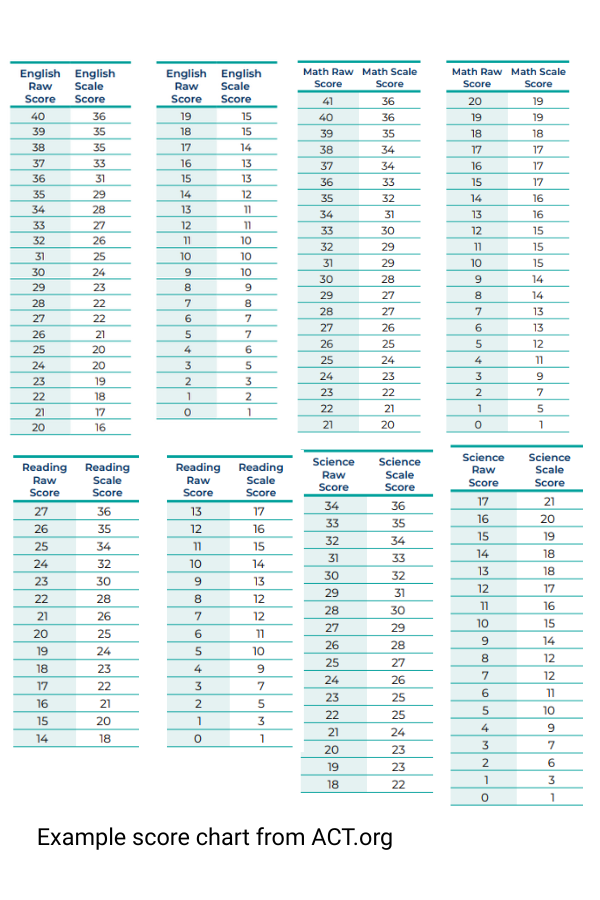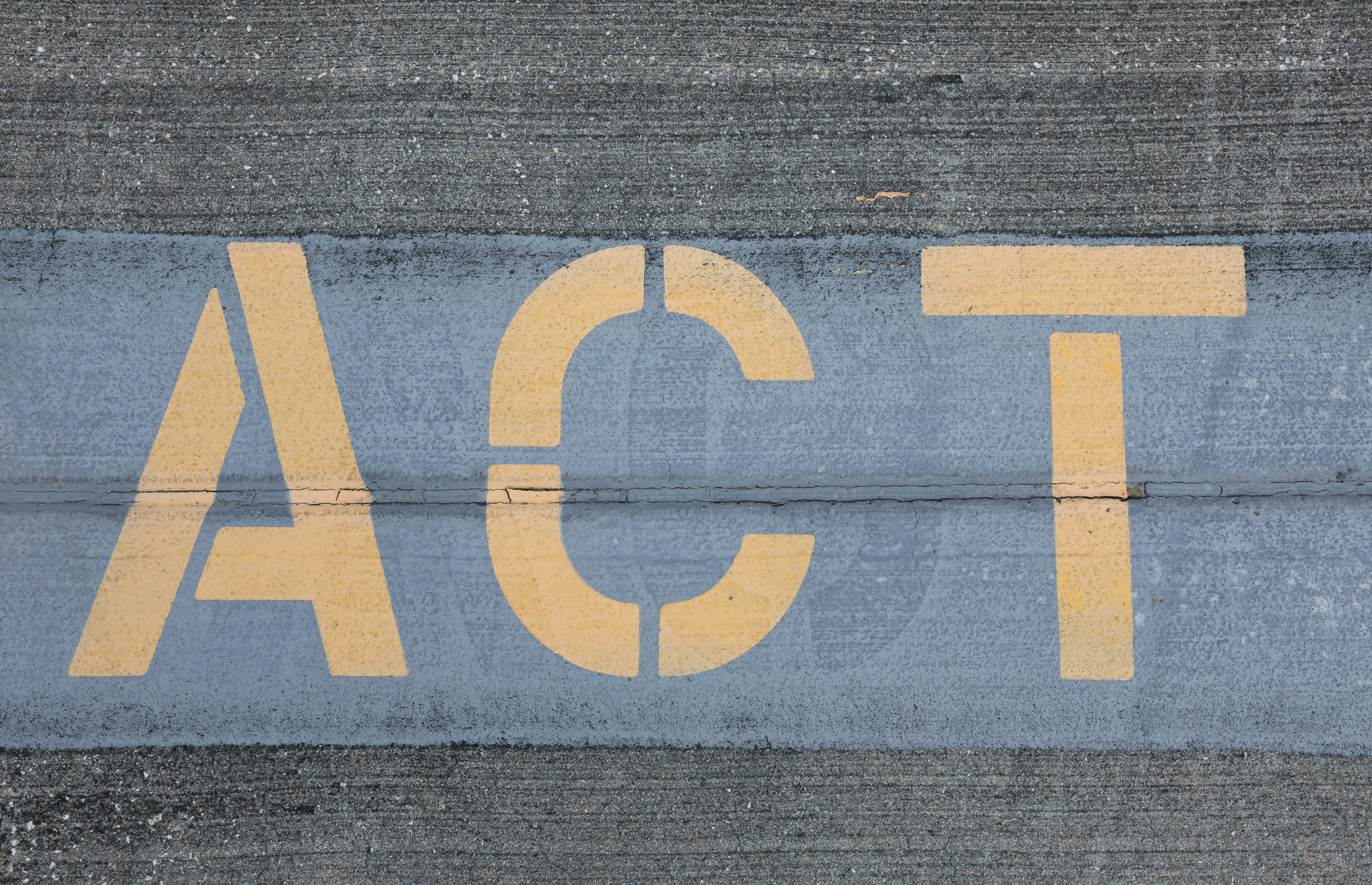
ACT Test Scores Explained
The ACT is made up of a composite score and four section scores: English, Math, Reading and Science. The composite score is calculated as the average of your four section scores. In this article, we’ll discuss how to read and interpret your scores, as well as what constitutes a good score on each section and what makes for an impressive composite score.

This blog was originally published on November 6, 2023. It has been updated with the most recent information.
The ACT is made up of a composite score and four section scores: English, Math, Reading and Science. The composite score is calculated as the average of your four section scores. In this article, we’ll discuss how to read and interpret your scores, as well as what constitutes a good score on each section and what makes for an impressive composite score.
What is the ACT score range and what does composite mean?
The ACT is scored on a scale of 1-36, with 36 being the highest possible score. Each section is scored on this scale, and the composite score is the average of English, Math, and Reading, while the optional Science section score is separate from your composite score regardless if you choose to take it or not.
What are ACT raw and ACT scale scores?
The raw score is simply a tally of all the questions you got right – it is calculated by adding the number of your correct answers. There is no penalty for guessing, so incorrect answers will not be given deductions.
The raw scores for each section will be converted to scaled scores using a conversion table specific to the test. The conversion from raw score to scaled score varies by test because it is curved depending on how difficult the test proved to be (i.e. how everyone who took the test performed on the test).
How to calculate ACT score by yourself
If you’re taking a practice test at home or with a test prep company, you may want to calculate your own scaled score based on the number of questions you got right and wrong. You can calculate your own ACT score by counting the number of questions you got right (your raw score) and then using the specific conversion table for that test to obtain your scaled scores. Composite score is the rounded average of the first three sections (27, 30, and 28). The science score is separate and does not get factored into the composite score.
Using the score conversion table (specific to this test) below, your raw scores would translate to scaled scores accordingly:
English 33 questions correct → 27 scaled
Math 33 questions correct → 30 scaled
Reading 22 questions correct → 28 scaled
Science 29 questions correct → 31 scaled
Your composite score would be a 28.3. (The ACT rounds your 28.3 average to a 28)

What is a good ACT score?
A “good” ACT score is one that meets or exceeds the average score for colleges you are interested in attending. The average ACT score for applicants would depend on the college you are looking to apply to, so it is important to research the average score for the colleges of your interest.
In general, a score above 20 is considered “above average”. However, you may want to check each college you are interested in for specific score requirements and expectations.
What ACT score is needed for college?
The ACT score you need would depend on the colleges you are looking to apply to.
For highly selective institutions like Ivy League Universities, a score of at least 34 is recommended by many college admission consultants.
ACT Score requirements for colleges in New York
While there are no ACT requirements per se, we can look at the median ACT score of accepted student at a sample list of colleges and universities in New York below:
- Columbia University: ~32–33
- Cornell University: ~34
- New York University: ~31
- Stony Brook University (SUNY): ~30
- Rensselaer Polytechnic Institute: ~30
- Fordham University: ~31
- Clarkson University: ~28–30
- Vassar College: ~34
- Skidmore: ~31–32
- Barnard College: ~31–32
- Syracuse University: ~28
- Rochester Institute of Technology: ~30
- SUNY Geneseo: ~27
- SUNY Binghamton: ~31
What is the highest ACT score?
The highest ACT score you can get is a 36. This doesn’t necessarily mean you need to get every answer on every section correct, just that your section scores average to a 36. You can score 35, 35, 36, 36 and you would still get a composite score of 36.
This scoring system can give you an edge compared to the SAT, where your composite score is a combination (addition, and not average) of your Verbal (Reading and Writing) and Math section scores.
What is the average ACT score?
For the 2025-26 school year, the average ACT score was 19.4.
Broken down, ACT average scores for each section were:
- English: 18.4
- Math: 18.9
- Reading: 20.0
- Science: 19.6
What is the passing score for ACT?
There is no passing score on the ACT.
Students should aim for the highest score possible and show improvement from one exam to the next. In general, you should keep in mind the accepted ACT score for accepted students of the college or university to which you’re applying. But your standardized test score is just one part of the whole application. The median is the middle and some students with terrific applications are often accepted even if their standardized test scores are not as good as the rest of the parts of the application.
What is ACT Superscore?
ACT Superscoring means when colleges take your best scores for each section and “recalculate” a composite score. This system can benefit you because you can target specific sections to improve for a given test, rather than trying to maximize your score on all sections.
What colleges in New York superscore the ACT?
In New York, the following colleges superscore the ACT:
- Columbia University
- Cornell University
- New York University
- Stony Brook University (SUNY)
- Rensselaer Polytechnic Institute
- Fordham University
- Clarkson University
- Vassar College
- Barnard College
- Syracuse University
- Rochester Institute of Technology
- University of Rochester
- West Point (US Military Academy)
This is not a complete list, so for additional information, you can check the admissions webpage for your school of interest.
How do I get my old or current ACT scores?
To see your ACT scores, you will need to login to your MyACT account. Once logged in, you should be able to check your scores under the “My Scores” tab. If you don’t remember your login information and have trouble with password recovery through the website, you can always access ACT customer service by phone, email, or chat. Their job is to help you navigate the website and find your scores easily.
Does the ACT score expire?
No, ACT scores do not expire. As long as you have access to your MyACT account, you will still be able to see your ACT scores.
How to send ACT scores to colleges?
You can either opt-in to send your ACT scores to colleges on the day of test administration, or you can send your scores after the test through the ACT portal.
How to get ACT scores without my ACT ID?
If you can’t remember your login information to my.act.org and cannot find your ACT ID, you’ll have to reach out to ACT customer support.
You can reach them by chat or email or call 319-337-1313.
How do you improve your ACT Score?
Improving your ACT score takes time and diligent practice. While every student is unique, we’ve boiled down our tried and true test prep method to the 5 steps below:
- Be Prepared: Start preparing well in advance of your target test date. Since test prep involves a review of all the content on the exam, learning strategies to do well on the particular test, and then lots of practice, we recommend giving yourself at least 3 months to study before your first official ACT date.
- Focus on content & strategy: Each of the 4 ACT sections requires you to learn certain material (e.g. grammar rules or algebra) and each section also has its own set of strategies that are important to master once you’ve covered all the content or material you need to learn. Many of the ACT strategies have to do with time management as this test simply doesn’t give you enough time to complete each question as thoroughly as you would in an in-class exam or homework problem set.
- Practice: Once you have a very good grasp of the content and strategies, practice taking whole sections of the test while timing yourself. We recommend taking proctored, mock exams, which we also offer at our test prep center.
- Review: Once you’ve completed test sections or full exams and gone over your results, make sure you redo the questions you got wrong and you have a very clear sense for how to get them right in the future. What is the mistake you made and what will you do during the next test or the real exam to make sure you get it right?
- Get help with the tough stuff. When you’re reviewing wrong answers, whether on practice exercises or full length tests, there are times you’ll feel stumped. Or maybe you just feel there’s no way you can answer the questions any faster to finish the section in time. That’s when you need a tutor or a coach to help. We can connect you to a ACT test prep expert to help at Ivy Tutors Network, but there are also a lot of free and low-cost resources out there to help with this important step. For example, you can search YouTube, Reddit, or TikTok for answer explained or check out the ACT Black Book.
ACT prep and getting the high score you aspire to can seem daunting at first. But if you give yourself enough time to learn the material, learn the strategies, and practice, you’re sure to see huge jumps in your score. We wish you the best on your ACT journey. And feel free to get in touch with any questions: info@ivytutorsnetwork.com




